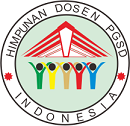EFEKTIVITAS BAHAN AJAR BERBASIS AUGMENTED REALITY DALAM MENINGKATKAN KEMANDIRIAN BELAJAR DAN PEMAHAMAN KONSEP IPA SISWA
DOI:
https://doi.org/10.24114/sejpgsd.v15i2.66281Keywords:
Augmented Reality, Conceptual Understanding, Independent Learning, Science Education, Teaching MethodsAbstract
The purpose of this study is to analyze the effectiveness of augmented reality (AR)-based teaching materials in enhancing students' understanding of science concepts and their independent learning skills in the subject of Natural Sciences (IPA) at Karawang Kulon II Elementary School. The methodology applied in this study is quantitative, incorporating a one-group pretest-posttest experimental design. Data collection involved administering written tests and questionnaires to assess students' conceptual understanding and learning independence. Results reveal that the average score achieved in the pretest for students was 64.2, while the average posttest score increased to 77.95, with the gain test indicating a substantial improvement. Additionally, the questionnaire results indicate that students' learning independence is categorized as very good, with a percentage of 90%. These findings highlight that the use of AR contributes to a better understanding of science concepts among students and supports their independent learning efforts. This research contributes meaningfully to the enhancement of innovative and effective teaching methods, while also offering educators insights for designing more engaging and interactive educational experiences.References
Afnan, Muhammad, K., Khan, N., Lee, M. Y., Imran, A. S., & Sajjad, M. (2021). School of the future: A comprehensive study on the effectiveness of augmented reality as a tool for primary school children’s education. Applied Sciences (Switzerland), 11(11). https://doi.org/10.3390/app11115277
Alalwan, N., Cheng, L., Al-Samarraie, H., Yousef, R., Ibrahim Alzahrani, A., & Sarsam, S. M. (2020). Challenges and Prospects of Virtual Reality and Augmented Reality Utilization among Primary School Teachers: A Developing Country Perspective. Studies in Educational Evaluation, 66, 1–23. https://doi.org/10.1016/j.stueduc.2020.100876
Demitriadou, E., Stavroulia, K. E., & Lanitis, A. (2020). Comparative evaluation of virtual and augmented reality for teaching mathematics in primary education. Education and Information Technologies, 25(1), 381–401. https://doi.org/10.1007/s10639-019-09973-5
Dewanti, A., & Putra, A. (2022). Pengembangan Video Animasi Untuk Meningkatkan Kemandirian Belajar Siswa Kelas V SD. Jurnal Penelitian Ilmu Pendidikan, 15(2), 178–188. https://doi.org/10.21831/jpipfip.v15i2.50209
Ekayogi, I. W. (2023). Penerapan Problem Based Learning Berbantuan Media Augmented Reality untuk Meningkatkan Hasil dan Kemandirian Belajar. Jurnal Didaktika Pendidikan Dasar, 7(1), 181–196. https://doi.org/10.26811/didaktika.v7i1.1126
Fitriani Eka, S., Muhsinah, A., & Dedi, K. (2018). Pengembangan Media Pembelajaran IPA menggunakan Augmented Reality (AR) Berbasis Android pada Siswa Kelas III SDN 015 Tarakan. Widyagogik, 6(1), 57–72. https://journal.trunojoyo.ac.id/widyagogik/article/download/4562/3172
Grinshkun, A. V., Perevozchikova, M. S., Razova, E. V., & Khlobystova, I. Y. (2021). Using Methods and Means of the Augmented Reality Technology when Training Future Teachers of the Digital School. European Journal of Contemporary Education, 10(2), 358–374. https://doi.org/10.13187/ejced.2021.2.358
Ma’arif, A. I., & Nursikin, M. (2024). Pendidikan Nilai di Era Digital: Tantangan dan Peluang. Afeksi: Jurnal Penelitian Dan Evaluasi Pendidikan, 5(2), 326–335. https://doi.org/10.59698/afeksi.v5i2.254
Maulana, I., Suryani, N., & Asrowi, A. (2019). Augmented Reality: Solusi Pembelajaran IPA di Era Revolusi Industri 4.0. Proceedings of The ICECRS, 2(1), 19–26. https://doi.org/10.21070/picecrs.v2i1.2399
Muzakki, H., Yulia Hidayatul Umah, R., & Mudawinun Nisa’, K. (2021). Teori Belajar Konstruktivisme Maria Montessori Dan Penerapannya Di Masa Pandemi Covid-19. Ibriez : Jurnal Kependidikan Dasar Islam Berbasis Sains, 6(1). https://doi.org/10.21154/ibriez.v6i2.164
Nirwanto, B. G., Murtono, M., & Fathurrohman, I. (2021). Media Puzzle Berbantu Augmented Reality pada Muatan Pelajaran IPA Tema Ekosistem. Jurnal Edutech Undiksha, 9(2), 275. https://doi.org/10.23887/jeu.v9i2.38503
Radisti, Hanum, A., Mirawati, I., Karimah, K. El, & Hanum, R. A. (2023). Mengembangkan Pesan Whatsapp tentang Edukasi Mindful Parenting dengan Prinsip Cognitive Theory of Multimedia Learning. AGUNA: Jurnal Ilmu Komunikasi, 4(01), 75. http://ejournal.amikompurwokerto.ac.id/index.php/AGUNA75
Resti, N., Ridwan, R., Palupy, R. T., & Riandi, R. (2024). Inovasi Media Pembelajaran Menggunakan AR (Augmented Reality) pada Materi Sistem Pencernaan. Biodik, 10(2), 238–248. https://doi.org/10.22437/biodik.v10i2.34022
Syahroni, M. (2020). Pelatihan Implementasi Media Pembelajaran Interaktif Guna Peningkatan Mutu Pembelajaran Jarak Jauh. International Journal of Community Service Learning, 4(3), 170–178. https://doi.org/10.23887/ijcsl.v4i3.28847
Verdinandus Lelu Ngono, & Taufik Hidayat, W. (2019). Pendidikan Di Era Digital. Jurnal Seminar Nasional Pendidikan, 628–638. https://jurnal.univpgri-palembang.ac.id/index.php/prosidingpps/article/view/3093
Additional Files
Published
Issue
Section
License
Copyright (c) 2025 SCHOOL EDUCATION JOURNAL PGSD FIP UNIMED

This work is licensed under a Creative Commons Attribution-ShareAlike 4.0 International License.
Authors whose manuscripts are approved are approved as follows:
- The publication rights for all journal manuscript materials published/published on the SEJ (School Education Journal) E-Journal site are held by the editorial board with the author's knowledge (moral rights remain with the manuscript authors).
- The formal legal requirements for accessing this electronic digital journal article are subject to the terms of the Creative Commons Attribution-ShareAlike (CC BY-SA 4.0) license, which means that E-Journal SEJ (School Education Journal) has the right to store, transfer media/format, manage in the form of a database, maintain, and publish articles without asking permission from the author as long as the author's name remains as the copyright owner.
- Manuscripts published/published electronically are open access for educational, research, and library purposes.













